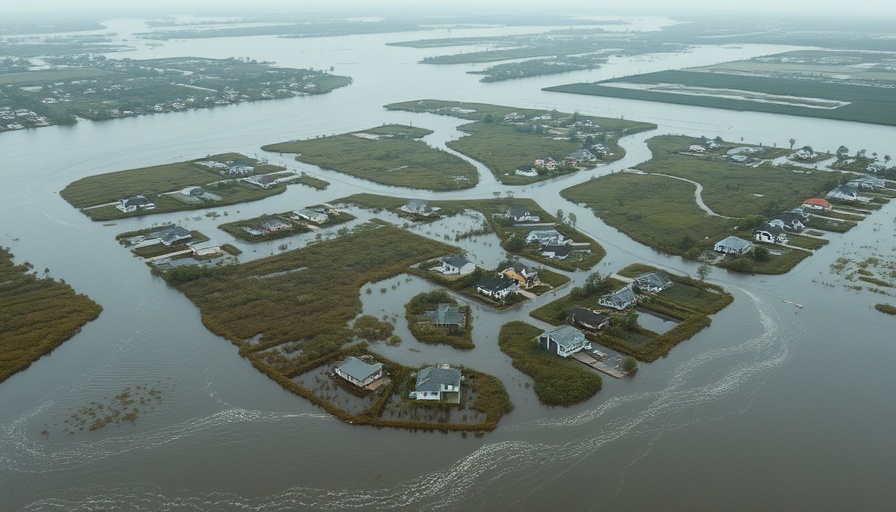
Trump Administration's Shocking Cut: A Blow to Disaster Preparedness
In a decision that has raised eyebrows nationwide, the Trump administration has discontinued the Building Resilient Infrastructure and Communities (BRIC) program, a vital initiative aimed at helping local communities better prepare for natural disasters. Announced by the Federal Emergency Management Agency (FEMA), the news comes amid broader discussions on the future of FEMA itself and highlights ongoing tensions between disaster preparedness funding and administration priorities.
Analyzing the Implications of Ending the BRIC Program
The BRIC program was established during Trump’s first term and expanded under Biden's administration with the objective of funding projects designed to enhance community resilience against disasters like floods and wildfires. It was primarily financed through the Infrastructure Investment and Jobs Act, with around $1 billion allocated toward its goals. While $133 million has been disbursed across nearly 450 projects nationwide, the halting of future applications and retraction of funds represents a significant policy shift.
Context: The Role of Disaster Preparedness in Today's Landscape
The decision to eliminate the BRIC program ties into larger discussions about funding for climate change initiatives and diversity-focused programs across the federal government. Critics argue that dismantling such programs could significantly hinder the ability of vulnerable communities, particularly low-income and marginalized neighborhoods, to effectively prepare for and respond to climate-related disasters. Those areas often bear the brunt of environmental changes and require additional support to enhance their infrastructure.
Repercussions: What Does This Mean for Communities?
Ending the BRIC program could have disastrous effects on local governments trying to address climate vulnerabilities. Projects funded by BRIC included essential enhancements, such as raising roads to mitigate flooding and constructing underground storage to combat droughts. As climate change leads to increasingly severe weather events, these types of improvements are paramount for safeguarding lives and property.
Future Predictions: The Potential Long-Term Effects
Looking ahead, the suspension of the BRIC program could lead to long-term vulnerabilities for communities across the U.S. Experts assert that without federal support, local governments might have to divert funds from other crucial services to cover the costs of disaster mitigation projects, thereby straining already limited budgets. Additionally, it raises questions about direct state funding arrangements that President Trump has proposed, which many fear may not address the complex needs of disaster preparedness effectively.
A Broader Perspective on Disaster Response Funding
Historically, federal disaster funding has evolved as a response to various crises, often learning from past disasters. The cancellation of the BRIC program underscores a disconnect between political agendas and the urgent, practical needs of communities fighting to safeguard against unpredictable natural disasters.
Counterarguments: Perspectives from Government Officials
Supporters of the Trump administration's decision cite the need to eliminate what they deem wasteful spending within FEMA. They argue that funding should prioritize immediate disaster response rather than long-term preparedness projects, suggesting a reallocation of resources could lead to more efficient disaster management. However, critics maintain that preparation is essential; they believe neglecting this aspect could result in larger costs during actual disasters.
Immediate Takeaways for Local Governments
As local municipalities scramble to adapt to the loss of BRIC funding, officials must begin exploring alternative avenues for disaster funding. Local governments might need to seek grants from non-federal organizations or create public-private partnerships to fill the budget gaps left in the wake of federally retracted support. Engaging community stakeholders and leveraging local resources can also bolster efforts to maintain resilience initiatives.
Joining the Conversation: Why Your Voice Matters
Understanding the implications of the BRIC program’s cancellation is crucial for all citizens. Engaging in dialogues with local government officials and advocating for funding that prioritizes disaster resilience could empower communities to protect themselves against the increasing severity of climate-related disasters.
The termination of the BRIC program raises profound questions about the balance between political decisions and the realities faced by communities vulnerable to calamities. While the Trump administration emphasizes a narrative of cutting waste, many in the field of disaster preparedness see the decision as a step backward in efforts to create resilient infrastructure that can withstand future challenges.
As citizens, it’s important to stay informed and involved in local governance as communities develop new strategies and funding opportunities to ensure they remain safeguarded against the ever-evolving landscape of natural disasters.
 Add Row
Add Row  Add
Add 




 Add Row
Add Row  Add
Add 








Write A Comment